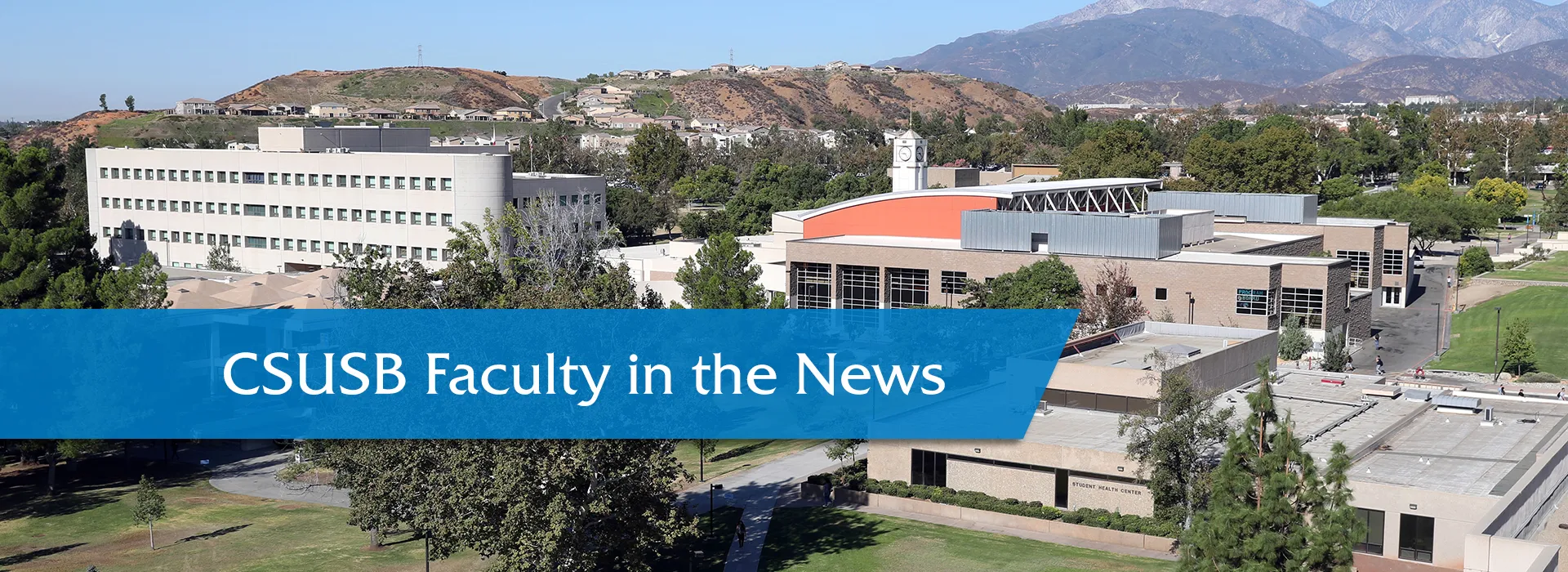NOTE: Faculty, if you are interviewed and quoted by news media, or if your work has been cited, and you have an online link to the article or video, please let us know. Contact us at news@csusb.edu.
Neglect is among the most common type of elder abuse, CSUSB professor says
WalletHub
Dec. 4, 2019
The personal finance website included a question-and-answer interview with Eric Voglesang, CSUSB associate professor of sociology and director of the Center on Aging, about elder abuse.
One of the most common types of elder abuse is neglect, Voglesang said. “Quite simply, neglect is a lack of necessary caretaking. I've seen estimates stating that neglect may account for up to 60% of elder abuse cases. This type of abuse can be active neglect (which is to say, neglect done on purpose); or it can be passive (that is, a caretaker accident or forgetfulness). Other common forms of elder abuse include physical abuse and financial abuse (each accounting for about 15% of elder abuse cases).”
Read the complete interview at Wallethub’s “Ask the Experts” feature that is part of its webpage, “2019’s States with the Best Elder-Abuse Protections.”
CSUSB professor surprised with award for documentary she co-produced
High Desert Daily
Dec. 8, 2019
Released in 2017, the documentary “1948: Creation and Catastrophe,” co-produced by Ahlam Muhtaseb, Cal State San Bernardino professor of communication studies, continues to win awards – the latest coming on Dec. 5.
The film won the Jerusalem International Film Festival’s Special Jury Award in the Feature Documentary category, and Muhtaseb learned of the prize while being interviewed by the director of the film festival Dr. Ezzedin Shalah via Skype during the awards ceremony, and broadcast and livestreamed on Facebook by Palestine TV.
Read the complete article at “CSUSB professor surprised with award for documentary she co-produce.”
‘First Amendment auditors’ are ‘pushing the envelope,’ CSUSB professor says
Palm Beach Post
Dec. 6, 2019
Brian Levin, director of CSUSB’s Center for the Study of Hate and Extremism, was interviewed for an article about people known on YouTube as “First Amendment Auditors.”
“Often made up of citizens with a disdain for authority, so-called ‘auditors’ show up with their cameras in public places and around government buildings across the United States, from post offices, police stations and FBI offices to city halls, libraries and overnight-delivery facilities,” the newspaper reported. “Once they start filming, they hope for dramatic reactions from public servants, business owners and especially police, who were the initial targets when the ‘auditor’ movement emerged about two years ago.”
“They are pushing the envelope on the First Amendment, which allows the recording of even the most obnoxious behavior in public places. But I don’t think they do so with an appreciation of the communities that they are in,″ said Levin.
Read the complete article at “Candid cameras gone wild: ‘Citizen Warriors’ portray police, others as YouTube villains.”
CSUSB center supports federal legislation aimed at preventing violent attacks by extremists
The Sun/The Press-Enterprise/Inland Valley Daily Bulletin/Redlands Daily Facts
Dec. 6, 2019
An article about U.S. Rep. Pete Aguilar (D-Redlands) reintroducing the Preventing Radical Extremists’ Violent Endeavors Now and Tomorrow, or PREVENT, Act included an interview with Brian Levin, director of the CSUSB Center for the Study of Hate and Extremism.
The legislation, originally introduced in the wake of the Dec. 2, 2015, mass shooting in San Bernardino, would provide federal resources, such as clinical social workers, psychologists, religious leaders and law enforcement personnel, to train local officials to prepare for and respond to threats by violent extremists and white nationalists.
Police-reported hate crimes in major cities across the country rose 9% in 2018, according to a report on hate crimes in the U.S. released in July by the Center for the Study of Hate and Extremism at Cal State San Bernardino.
Extremist homicides overall were down in 2018. However, white nationalist or far-right-motivated homicides are on the rise. There were three in 2016, 13 in 2017, 17 in 2018 and 26 so far in 2019, Levin said.
The center supports Aguilar’s efforts, Levin said.
“What we’re seeing is a splintering of society and when that happens, certain movements will expand more quickly,” Levin said, adding that white supremacy has coalesced into the mainstream.
Read the complete article at “Bill inspired by San Bernardino terrorist attack reintroduced by Redlands’ Rep. Pete Aguilar.”
These news clips and others may be found at “In the Headlines” at inside.csusb.edu.
